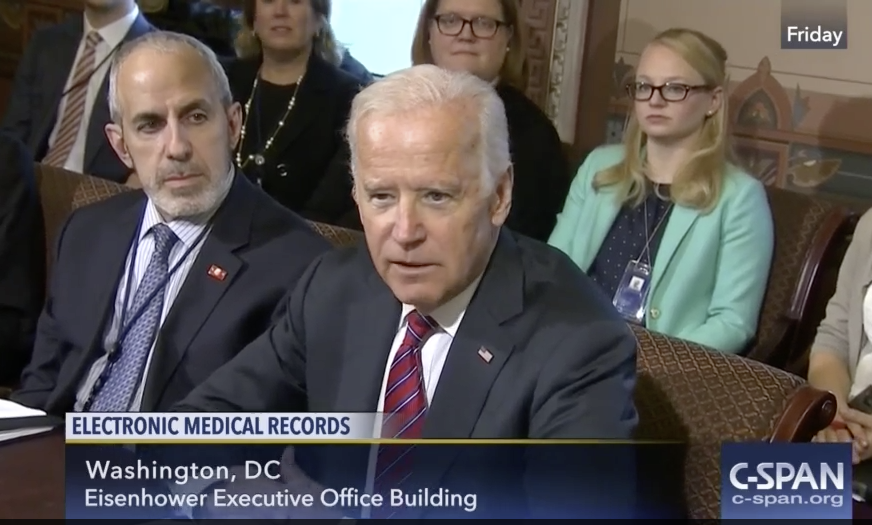EHR Backlash
See the following -
Obama and Biden Blast EHR Vendors for Data Blocking
 As they are winding their terms in office, President Barack Obama and Vice President Joe Biden dropped a stink bomb on the health IT industry. Speaking at different events on Friday, January 9th, the President and Vice President both criticized proprietary electronic health record (EHR) vendors as the primary obstacle to the success of their administration’s health care strategy. This is the highest level acknowledgment so far of the serious impact that “lock-in” EHR software vendors are having on America’s medical infrastructure and the ability of physicians to provide medical care.
As they are winding their terms in office, President Barack Obama and Vice President Joe Biden dropped a stink bomb on the health IT industry. Speaking at different events on Friday, January 9th, the President and Vice President both criticized proprietary electronic health record (EHR) vendors as the primary obstacle to the success of their administration’s health care strategy. This is the highest level acknowledgment so far of the serious impact that “lock-in” EHR software vendors are having on America’s medical infrastructure and the ability of physicians to provide medical care.
Obama's Electronic Medical Records Scam
 Here’s more evidence that government “cures” are inevitably worse than the “diseases” they seek to wipe out. Buried in the trillion-dollar stimulus law of 2009 was an electronic medical records “incentive” program. Like most of President Obama’s health care rules, this top-down electronic record-sharing scheme is a big fat bust. Oversight is lax. Cronyism is rife. The job-killing and privacy-undermining consequences have only just begun.
Here’s more evidence that government “cures” are inevitably worse than the “diseases” they seek to wipe out. Buried in the trillion-dollar stimulus law of 2009 was an electronic medical records “incentive” program. Like most of President Obama’s health care rules, this top-down electronic record-sharing scheme is a big fat bust. Oversight is lax. Cronyism is rife. The job-killing and privacy-undermining consequences have only just begun.
- Login to post comments
Pentagon's $11 Billion Healthcare Record System Will Be Obsolete Before It's Even Built
In order to understand why the modernization initiative is doomed to failure, you need only grasp the significance of two key phrases the program office uses in its approach to industry for proposals. First, it says it is seeking a “state-of-the-market” electronic health record system. Second, it says whatever it selects will be an “off-the-shelf” product. In other words, it is seeking to acquire an electronic health record system that already exists in an industry noted for its antiquated approach to the movement of information.
- Login to post comments
Readers Debate Causes of, Solutions to Limited EHR Usability
 The advent of meaningful use is certainly responsible for increasing EHR adoption, but it hasn't ensured EHR usability and is likewise responsible oversaturating the EHR marketplace with health IT products which might have otherwise floundered without billions in EHR incentives. Recent research published in the Journal of American Medical Association (JAMA) finds that EHR usability is lacking among EHR vendors. Read More »
The advent of meaningful use is certainly responsible for increasing EHR adoption, but it hasn't ensured EHR usability and is likewise responsible oversaturating the EHR marketplace with health IT products which might have otherwise floundered without billions in EHR incentives. Recent research published in the Journal of American Medical Association (JAMA) finds that EHR usability is lacking among EHR vendors. Read More »
- Login to post comments
Rep. Burgess' Office Releases Draft Interoperability Bill for Discussion
 The office of Rep. Michael Burgess, MD (R-TX) released a draft of the interoperability bill that they have been working for the past several months on Friday. Rep. Burgess, one of the few physicians in Congress, has been working very hard with his staff to come up with legislation that can fix the current Health IT "lock-in" crisis. This is a bipartisan effort that has full backing from the top leadership in Congress. The staff is seeking input from the Health IT community on the draft bill. Burgess's office will take comments on the draft through March 13. Rep. Burgess' staff was kind enough to provide Open Health News with a copy of the draft legislation. We have posted the entire draft bill as is below and will be writing some our thoughts over the next few days.
The office of Rep. Michael Burgess, MD (R-TX) released a draft of the interoperability bill that they have been working for the past several months on Friday. Rep. Burgess, one of the few physicians in Congress, has been working very hard with his staff to come up with legislation that can fix the current Health IT "lock-in" crisis. This is a bipartisan effort that has full backing from the top leadership in Congress. The staff is seeking input from the Health IT community on the draft bill. Burgess's office will take comments on the draft through March 13. Rep. Burgess' staff was kind enough to provide Open Health News with a copy of the draft legislation. We have posted the entire draft bill as is below and will be writing some our thoughts over the next few days.
Southcoast Health Cutting Dozens of Jobs on Heels of Expensive Epic Implementation
 Stung by losses linked to costly technology upgrades, Southcoast Health is laying off 95 employees just a year after finalizing a similar staffing cut.The cuts represent 1 percent of Southcoast’s 7,251 workforce, and will happen across the care provider's three hospitals in Fall River, Wareham and New Bedford. All levels of hospital staff will be affected, officials said. Southcoast employees were notified of the cut Wednesday morning...
Stung by losses linked to costly technology upgrades, Southcoast Health is laying off 95 employees just a year after finalizing a similar staffing cut.The cuts represent 1 percent of Southcoast’s 7,251 workforce, and will happen across the care provider's three hospitals in Fall River, Wareham and New Bedford. All levels of hospital staff will be affected, officials said. Southcoast employees were notified of the cut Wednesday morning...
- Login to post comments
Study: Hospitals in for rough ride in 2014
Not-for-profit hospitals are in for another rough economic ride in 2014, reflecting the cumulative impact of changing economic trends over the past six years and new financial and technology challenges. Read More »
- Login to post comments
Tech Companies Blew Their Chance with Health Records
Turns out, though, that the tech industry is just as selfish as any other private concern. A new report from the National Coordinator for Health Information Technology finds that instead of innovating, companies developing electronic health records did their best to create expensive systems that were very difficult to share, all in the hope of locking clients into lucrative, long-term contracts. Instead of developing standardized, open source software that would allow the easy transfer of health records from a doctor's office in Houston to an emergency room in Dallas, software developers sold systems that make such a transfer almost impossible if the doctor and hospital don't have the same vendor.
- Login to post comments
The Politics of the EHR: Why we’re not where we want to be and what we need to do to get there
 By now, it seems abundantly clear that the vast potential offered by universal adoption of electronic health records (EHR) has not been achieved. Indeed, the fulfillment of that potential seems a long way off. Unsolved problems with interoperability, usability, safety, and security, to name a few, remain, and continue to pose barriers to universal adoption. There is ample evidence in the medical literature, of the unsolved problems of the EHR. Indeed, two recent reports that offer (probably inadequate) solutions highlight the difficulties that exist with the EHR. The proliferation of these problems has only increased with the increase in adoption of the EHR by physicians and institutions. The Texas Medical Association has asked the (at the time) ONC, Farhad Mostashari, MD, to establish a health IT patient safety czar.1 Read More »
By now, it seems abundantly clear that the vast potential offered by universal adoption of electronic health records (EHR) has not been achieved. Indeed, the fulfillment of that potential seems a long way off. Unsolved problems with interoperability, usability, safety, and security, to name a few, remain, and continue to pose barriers to universal adoption. There is ample evidence in the medical literature, of the unsolved problems of the EHR. Indeed, two recent reports that offer (probably inadequate) solutions highlight the difficulties that exist with the EHR. The proliferation of these problems has only increased with the increase in adoption of the EHR by physicians and institutions. The Texas Medical Association has asked the (at the time) ONC, Farhad Mostashari, MD, to establish a health IT patient safety czar.1 Read More »
- Login to post comments
The Value of EHR Interoperability that Money Can't Buy
 There seems to be something missing in our national debate about health care and the use of health information technologies (IT) in this marketplace. Do we want a more 'open' healthy society, or a more closed system? What role should markets play in public health and medical sociology? How do we decide which EHR solutions to acquire? Should we be looking more closely at open source alternatives versus proprietary programs. Should money, quality of care, or some other non-market values determine what's best for the patient? This cuts to the heart of the debate. Consider the hospital that chooses to not pay an expensive proprietary EHR vendor for the enhanced code required by a doctor in order to get the latest real time knowledge for treating a patient's disease.
There seems to be something missing in our national debate about health care and the use of health information technologies (IT) in this marketplace. Do we want a more 'open' healthy society, or a more closed system? What role should markets play in public health and medical sociology? How do we decide which EHR solutions to acquire? Should we be looking more closely at open source alternatives versus proprietary programs. Should money, quality of care, or some other non-market values determine what's best for the patient? This cuts to the heart of the debate. Consider the hospital that chooses to not pay an expensive proprietary EHR vendor for the enhanced code required by a doctor in order to get the latest real time knowledge for treating a patient's disease.
- Login to post comments
Towards a New EHR Metaphor - Or, How to Fix Unusable EHRs
 News flash: docs hate Excel! In a recent study, which included researchers from Yale, the Mayo Clinic, Stanford, and the AMA, physicians rated it only at 57% on a usability rating, far below Google search (93%), Amazon (82%), or even Word (76%). But, of course, Excel wasn't their real problem; the study was aimed at electronic health records (EHRs), which physicians rated even lower: 45%, which the study authors graded an "F." If we want EHRs get better, though, we may need to start with a new metaphor for them.Lead author Edward Melnick, MD, explained the usability issue: "A Google search is easy. There's not a lot of learning or memorization; it's not very error-prone. Excel, on the other hand, is a super-powerful platform, but you really have to study how to use it. EHRs mimic that."
News flash: docs hate Excel! In a recent study, which included researchers from Yale, the Mayo Clinic, Stanford, and the AMA, physicians rated it only at 57% on a usability rating, far below Google search (93%), Amazon (82%), or even Word (76%). But, of course, Excel wasn't their real problem; the study was aimed at electronic health records (EHRs), which physicians rated even lower: 45%, which the study authors graded an "F." If we want EHRs get better, though, we may need to start with a new metaphor for them.Lead author Edward Melnick, MD, explained the usability issue: "A Google search is easy. There's not a lot of learning or memorization; it's not very error-prone. Excel, on the other hand, is a super-powerful platform, but you really have to study how to use it. EHRs mimic that."
- Login to post comments
Upsurge in Emergency Department Information Technology Replacements, 72% of Hospitals Dissatisfied With Interoperability & Usability Finds Black Book
 Black Book surveyed 738 emergency department administrative and nursing managers, and 1,104 ED physicians (over half are members of the American College of Emergency Physicians). 89% of ED leaders believe their hospitals rushed to purchase new EHRs and ED systems between 2010 and 2013 for meaningful use dollars, just to see productivity fall, liability rise and connectivity stall. Read More »
Black Book surveyed 738 emergency department administrative and nursing managers, and 1,104 ED physicians (over half are members of the American College of Emergency Physicians). 89% of ED leaders believe their hospitals rushed to purchase new EHRs and ED systems between 2010 and 2013 for meaningful use dollars, just to see productivity fall, liability rise and connectivity stall. Read More »
- Login to post comments
Why do EHR Firms Own Patient Data When Other Software Vendors Don't?
 There's a healthy debate going on about healthcare data interoperability and I think the more we discuss it, the better off we'll be. It's absolutely crucial that all healthcare information systems be able to talk to each other in a way that is useful to both physicians/clinicians as well as patients. The only way to have truly interoperable systems is to have free (but safe and secure) data interchange and exchange requires access rights and an understanding of ownership rules. One part of the discussion that many vendors of electronic health records (EHRs), a large portion of the health IT ecosystem, don't want to have is about the ownership of patient data stored in "their" EHR systems.
There's a healthy debate going on about healthcare data interoperability and I think the more we discuss it, the better off we'll be. It's absolutely crucial that all healthcare information systems be able to talk to each other in a way that is useful to both physicians/clinicians as well as patients. The only way to have truly interoperable systems is to have free (but safe and secure) data interchange and exchange requires access rights and an understanding of ownership rules. One part of the discussion that many vendors of electronic health records (EHRs), a large portion of the health IT ecosystem, don't want to have is about the ownership of patient data stored in "their" EHR systems.
- Login to post comments
Why Health Care Tech Is Still So Bad
Last year, I saw an ad recruiting physicians to a Phoenix-area hospital. It promoted state-of-the-art operating rooms, dazzling radiology equipment and a lovely suburban location. But only one line was printed in bold: “No E.M.R.” In today’s digital era, a modern hospital deemed the absence of an electronic medical record system to be a premier selling point.
- Login to post comments
- previous page
- 1
- 2
- 3
- 4